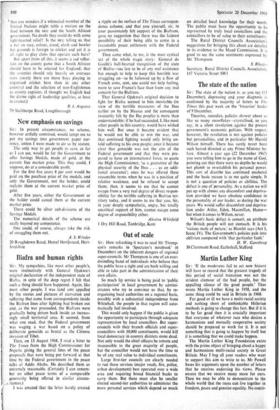Out of scale
Sir: How refreshing it was to read Mr Thomp- son's remarks in 'Spectator's notebook' (6 December) on the inherent dangers of regional super-councils. Mr Thompson is one of an ever- dwindling band of individuals who believe that the public have a right and are both willing and able to take part in the administration of their own affairs.
So much lip service is being paid to 'public participation' in local government by admini- strators who try to convince us that, by re- organising local authorities on a regional basis, possibly with a substantial independence from Whitehall, the people in that region will auto- matically feel involved.
This would only happen if the public is given the opportunity to participate through adequate representation by local councillors. But super- councils with their branch officials and super- councillors with 30,000 constituents, would kill local democracy in country districts stone dead. Not only would the chief officers be remote and inaccessible to the great majority of people, but the councillor would not have the time to be of any real value to individual constituents.
Large first-tier councils are clearly needed to run those services (major roads, fire, police, urban development) best operated over a wide area and requiring broad financial backs to carry them. But there must also be smaller elected second-tier authorities to administer the more personal services which depend so much
on detailed local knowledge for their worth. The public must have the opportunity to be represented by truly local- councillors and the councillors to be of value to their constituents.
The Rural District Councils Association's suggestions for bringing this about are detailed in its evidence to the Maud Commission. It is good to see the same sentiments expressed by Mr Thompson.
S. Rhodes Secretary, Rural District Councils, Association, 147 Victoria Street SW1


































 Previous page
Previous page